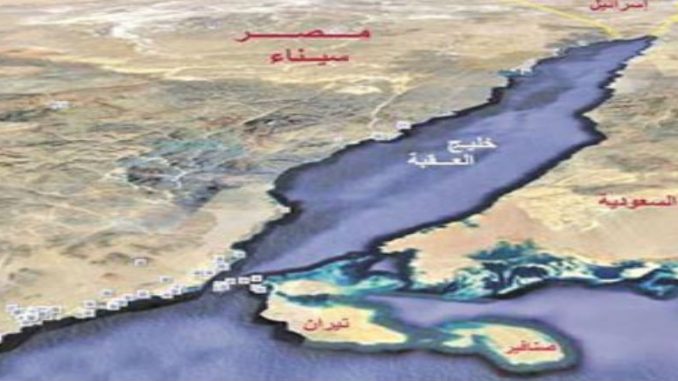
A diplomatic source at the Egyptian Ministry of Foreign Affairs unveiled that the Egyptian government had informed Israel that it is serious in handing over Tiran and Sanafir islands to Saudi Arabia before it officially announced its approval of the maritime border agreement with Saudi Arabia and referred it to the parliament for ratification on December 29, 2016.
The source explained that one of the main reasons that led Abdel Fattah al-Sisi regime to delay approving the agreement officially and transferring it to the parliament for ratification was that the United States of America had stipulated that both Egypt and Saudi Arabia must obtain a written approval from (Israel) on the transfer of sovereignty over the two islands, and that Cairo and Riyadh must confirm their commitment not to harm Israel’s security, or the procedures stated in the Egyptian-Israeli peace agreement (Camp David Accord).
Moreover, the source unveiled that no direct negotiations or correspondence were held between Saudi Arabia and Israel and that Egypt played the role of mediator between the two countries, and that it has informed Tel Aviv of the kingdom’s pledges that the situation on the two islands will remain as it is.
The source also unveiled that, “On the same day that Egypt and Saudi Arabia has signed the maritime agreement in Cairo on April 4, 2016, the Saudi Deputy Crown Prince Mohammed bin Salman sent a letter to Egypt’s Prime Minister Sherif Ismail assuring that Saudi Arabia is bound to Egypt’s commitments in ‘Tiran” Strait and the two islands of Tiran and Sanafir.
Accordingly, Saudi Arabia is committed to inherit all the duties stated in the peace agreement between Egypt and Israel especially in allowing the Multinational Force and Observers (MFO) and the civil police forces to perform their role in maintaining security on the islands. In addition, Saudi Arabia should not station any military forces on the islands.
Throughout the next five months that followed signing the maritime agreement between Egypt and Saudi Arabia, Egyptian-Saudi committees translated the agreement into geographic and cadastral maps that identify the regional waters for both countries and ensured the two islands belong to Saudi Arabia.
In addition, Cairo has handed Riyadh documents about the means to secure the islands and the locations of both the MFO and the civil police forces on the islands, but the procedures were disrupted since September as a result of the tensions between Cairo and Riyadh on the Syrian crisis and Egypt’s relations with Russia after Egypt voted in favor of the Russian resolution in the UN Security Council.
However, after high-level secret communications between both countries to end the issue of the two islands and implement the singed maritime agreement, Egypt’s Foreign Minister Sameh Shoukry sent a letter to Israel’s Prime Minister Benjamin Netanyahu on December 18 to inform him that Egypt is serious in handing over Tiran and Sanafir islands to Saudi Arabia and that Saudi Arabia has committed to preserving Egypt’s former commitments towards Israel in Tiran straits and the two islands and that it has no intention to station any military forces there.
Shoukry has also informed Netanyahu about the content of the Egyptian, Saudi and American communications regarding that issue and he sent him the new maps that determine the regional water as well as the international and security presence there.
On December 19, Netanyahu sent to Shoukry a letter ensuring that Israel does not mind transferring the sovereignty over the two islands to Saudi Arabia and that it approves the Egyptian maps and the security deployment plan to be applied as well as King Salman’s Bridge project.
Netanyahu ended the letter saying, “These procedures do not represent any violation to the peace agreement between Egypt and Israel.”
The Egyptian diplomatic source informed the military leadership in the three countries on the importance of maintaining the ongoing disarmament on the two islands and to rely only on the civilian police in securing the beaches.
According to this written Israeli consent, the Egyptian-Saudi agreement would come into force before being ratified by the Egyptian Parliament or a final court verdict be issued by the Egyptian Administrative Court.
The maritime border demarcation agreement was signed in April between Egypt and Saudi Arabia during King Salman’s visit to Egypt.
On June 20, 2016, Egypt Administrative Court ruled the invalidity of the controversial demarcation agreement that stipulates the transfer of Tiran and Sanafir islands to Saudi Arabia.
A number of lawsuits were filed in an attempt to nullify the agreement. The administrative court voided the accord in June after a lawsuit was filed against it, saying Egyptian sovereignty over the islands held and could not be given up.
In response, the Egyptian government appealed against the administrative court’s nullification of the al-Sisi plan to cede control of the two Red Sea Islands to Saudi Arabia.
Last month, Egypt’s Administrative Court confirmed the ruling that nullifies the transfer of the two Red Sea islands of Tiran and Sanafir to Saudi Arabia.
The court ruled that the government should abide by its previous verdict not to place the two islands in the Saudi waters.
The court is scheduled to issue its final verdict on 16 January.
However, the Egyptian government approved that the maritime border deal and sent it to the parliament for ratification despite the legal dispute over the deal.
The controversial agreement that gave away the two strategic islands of Tiran and Sanafir to Saudi Arabia has led to massive criticism and outrage among the Egyptians. Critics, journalists, and activists accused Abdel Fattah al-Sisi of “selling Egypt” to Saudi Arabia in return for financial aid.
In response, thousands of Egyptians took to the streets in protests on April 15 (Land Day) and April 25 (Sinai Liberation Day) against the agreement, calling for the “Downfall of the Regime.”
The demonstrations were the first huge movement against the al-Sisi regime that included different political affiliations and groups.
The Egyptian security forces led arrest campaigns of activists and journalists who opposed the transfer of the islands.
The Egyptian courts have fined tens of the protesters while others were handed down prison sentences that ranged from two to five years. In addition, a court sentenced seven defendants to eight years in prison each and fined them.
On the other hand, al-Sisi defended the agreement in a televised speech in April, saying that “Egypt does not sell its land to anyone and it does not take anyone’s land.”
Moreover, the Egyptian cabinet assured in a previous statement that the strategic islands are Saudi, adding that Saudi Arabia requested Egypt to protect them in 1950, and they have been under Egypt’s control since then.
The two Red Sea islands, which are strategically significant as they both control maritime activity in the Gulf, are located at the Gulf of Aqaba.
The Tiran Island is located in the Gulf of al-Aqaba, about 5 or 6 km from the Sinai Peninsula, and it has a total area of about 80 square km. Sanafir Island lies to the east of Tiran with a total area of 33 square km.
http://thenewkhalij.org/ar/node/56358



